

Copyright a Little Fuzzy? Lesson Plans – Search Education – Google. Picking the right search terms Beginner Pick the best words to use in academic searching, whether students are beginning with a full question or a topic of just a few words.
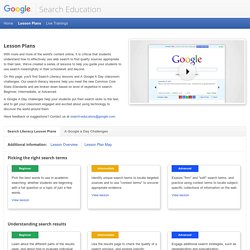
3rd – 5th Grade Search Lesson. In this lesson we will be focusing on learning if you can trust a website based on its looks.
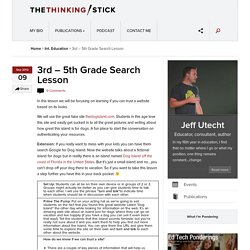
We will use the great fake site thedogisland.com. EduPic Graphical Resource for Educators. Understanding the Complexities of Fair Use, Creatively and In the Classroom. (Image Source) Dawn Thomsen from the Lamp reached out recently to share some resources that can help teachers and students understand Fair Use.
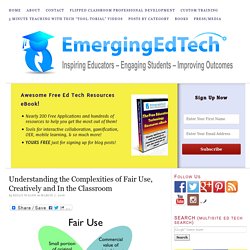
We were just discussing this in the Emerging Information Technology course I teach at The College of Westchester, so it really struck a chord. Cb copyright. Turning Students into Good Digital Citizens. 21st Century Literacy | In Print Page 2 of 4 Turning Students into Good Digital Citizens "We found that, when young people are required to do those things--when they're part of the school assignments or the classroom content--the students became more likely to do those things during their discretionary time," Kahne explains.
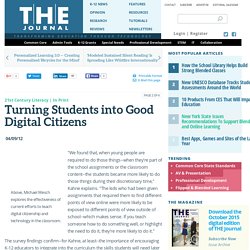
Digital Dossier. Basic Search Education Lesson Plans - GoogleWebSearchEducation. Web search can be a remarkable research tool for students - and we've heard from educators that they could use some help to teach better search skills in their classroom.
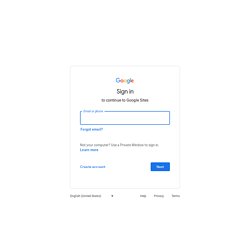
The following Search Education lessons were developed by Google Certified Teachers and the Search Education team to help you do just that. The lessons are short, modular and not specific to any discipline so you can mix and match to what best fits the needs of your classroom. Additionally, all lessons come with a companion set of slides (and some with additional resources) to help you guide your in-class discussions. InCtrl. Net Toolkit. Legal Music For Videos.
Many musicians choose to release their songs under Creative Commons licenses, which give you the legal right to do things like use their music in your videos. What is Creative Commons? Creative Commons is a system that allows you to legally use “some rights reserved” music, movies, images, and other content — all for free. CC offers free copyright licenses that anyone can use to mark their creative work with the freedoms they want it to carry. For instance, a musician might use a Creative Commons license to allow people to legally share her songs online, make copies for friends, or even use them in videos or make remixes. For more information, visit our Learn More page. Where can I find CC-licensed music? Several sites offer music published under Creative Commons’ flexible copyright licenses. #digcit JVLA 10-17-2013. Do Your Students Know How To Search?
The Connected Student Series: There is a new digital divide on the horizon.
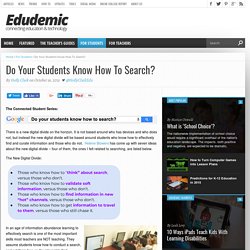
It is not based around who has devices and who does not, but instead the new digital divide will be based around students who know how to effectively find and curate information and those who do not. Helene Blowers has come up with seven ideas about the new digital divide – four of them, the ones I felt related to searching, are listed below. The New Digital Divide: In an age of information abundance learning to effectively search is one of the most important skills most teachers are NOT teaching.
Teachers – especially in the elementary grades -need to develop a shared vocabulary around the skill of searching. PSA Plagiarism. Teach Kids To Be Their Own Internet Filters. ” credit=”flickingerbrad/Flickr It’s becoming less and less effective to block students from websites.
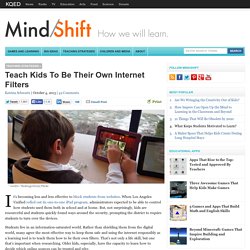
When Los Angeles Unified rolled out its one-to-one iPad program, administrators expected to be able to control how students used them both in school and at home. But, not surprisingly, kids are resourceful and students quickly found ways around the security, prompting the district to require students to turn over the devices. Students live in an information-saturated world. Pause and Think Online. What is Creative Commons? Wanna Work Together RG Remix. Creative Commons - Get Creative. Y2008 Code of Best Practices for Fair Use in Media Literacy Education. Digital Citizenship Flashcards. Another academic year is here and with it comes new clothes, lessons, and of course, new technologies.
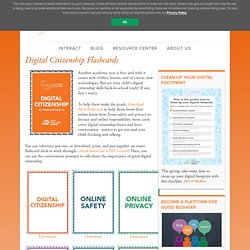
But are your child's digital citizenship skills back-to-school ready? If not, don't worry. 17 Cartoon Videos Explaining the Internet and Internet Safety to Kids. Didn't Your Mother Tell You Not to Google? Think about 2008 for a minute.
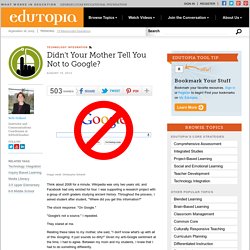
Wikipedia was only two years old, and Facebook had only existed for four. I was supporting a research project with a group of sixth graders studying ancient history. Throughout the process, I asked student after student, "Where did you get this information? " The stock response: "On Google. " "Google's not a source," I repeated. They stared at me. Relating these tales to my mother, she said, "I don't know what's up with all of this Googling. As adults, we remember when being told to "look it up" implied hauling out an encyclopedia or dictionary, sifting through a card catalog, or even using a book's index. Incredible Clip Art & Public Domain Images. 4 Free Photos - Public domain images and free photos.
5000 Free Stock Photos. Commons. Public Domain Resources. Public domain does not fully describe the types of resources available on this page.
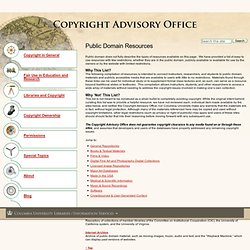
We have provided a list of easy to use resources with few restrictions, whether they are in the public domain, publicly available or available for use by the owners or by the website with limited restrictions. Why This List? The following compilation of resources is intended to connect instructors, researchers, and students to public domain materials and publicly accessible media that are available to users with little to no restrictions. Materials found through these links can be used for individual study or to supplement formal class lectures and, as such, can serve as a resource beyond traditional slides or textbooks. This compilation allows instructors, students, and other researchers to access a wide array of materials without needing to address the copyright issues involved in making one’s own collection.
YouTube. A Must Have Poster on Copyright Guidelines for Teachers. Our students' excessive dependence on digital content is going wild and this obligates us from an ethical point of view ( at least ) to be ourselves aware of the copyright issues related to the use, dissemination, and redistribution of such content and also to teach our kids and students about the guidelines they have to respect when using electronic materials. The "Whatever online is Free" mentality should change and students need to constantly be reminded of the ethical codes and copyright rules they have to abide by to use the online content in an ethically sound manner. Given the importance of this topic in education, Educational Technology and Mobile Learning has devoted an entire section just for posts about copyright resources. Parent Guide to Online LIfe. YouTube. Teaching Students To Use Critical Thinking To Find Quality Websites. 3rd – 5th Grade Search Lesson.
Fact, Fiction or Opinion? Evaluating Online Info. The Internet is a rich source of information -- and a prolific dispenser of misinformation. Help your students learn to tell the difference! Included: Links to site-evaluation tools! "Information competence is the fusing or the integration of library literacy, computer literacy, media literacy, technological literacy, ethics, critical thinking, and communication skills. " -- from a California State Polytechnic University report on information competence Information literacy used to be easier. Today's students, many of whom do most of their research online, are able to access a nearly limitless supply of information -- much of it from unknown sources. The result is a World Wide Web of academic excellence, inadvertent ignorance, and blatant bias.